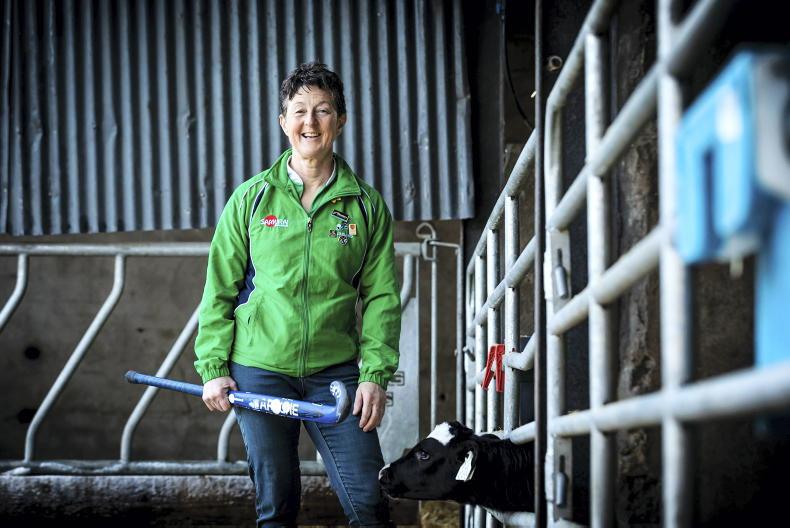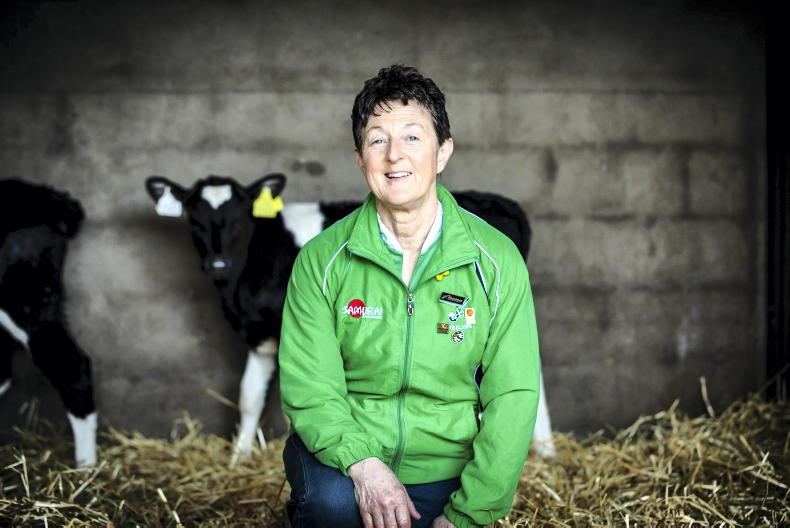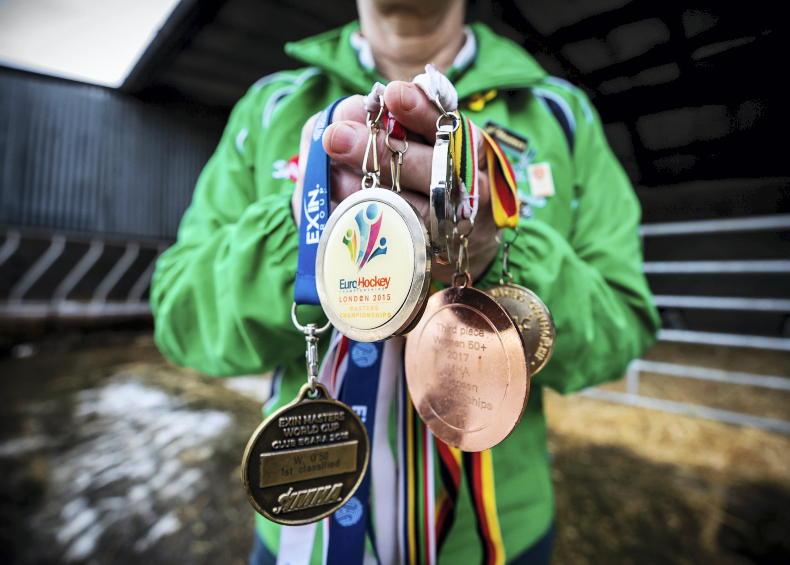Living on a dairy farm, Marian O’Brien is calving cows around the clock - and all while playing hockey at club, provincial and national level.
Originally from Galway, she has always lived on a farm. She met husband Kieran at a Bruce Sprinsteen concert in 1985 and they have lived in Ardcath, Co Meath ever since. With four children at home, Charlie (22), Aoibh (18), Conor (17) and Liam (15), it’s all hands-on deck keeping the household organised and getting the farm work done.
Passion for the game
Starting hockey in secondary school at the age of 12, Marian explains that she was late to the game, compared to most. At the time, hockey was new to Seamout College in Kinvara and they played on a “poor grass” pitch. Although harder to play on, she explains that it was an advantage in a roundabout way. When the team “played on gravel pitches we were flying”.
Marian’s determination on the pitch was recognised when she was selected for the under 18s Irish development team - the only player picked from Connaught at that time. “We used to come up to Dublin for training,” she recalls.
Nursing was her calling however, and with only one day off a week it wasn’t feasible to play hockey at an international level, but she didn’t give it up completely. Marian played summer hockey with the Mater Hospital until she qualified from nursing. It was a mixed team and included a heart surgeon, Freddie Wood, in goal.
“It was brilliant,” she says. “We had a great team.”
In 1985 Marian joined Clontarf hockey club and then went on to play for Swords until they merged with Dublin North Hockey Club (DNHC). Marian now enjoys playing on a team with a younger group of women.
“They keep me young really and? on my toes. I can listen to what’s going on and all the trends. I know all about Love Island!” she says.
Playing in Competition A of the Leinster League, the level is slightly higher. “It helps me now certainly in the Irish squad as a lot of the masters wouldn’t be playing at this level,” she explains.
Masters Hockey
Hockey Ireland is represented by a range of men’s and women’s Masters squads. It has teams for women over 35 to over 60 and men over 35 to over 70 representing Ireland in international tournaments.
Playing for the Masters came about for Marian in 2012, while playing a match against Loretto.
“One of the women just happened to notice I was no spring chicken I suppose, and asked me if I would be interested. I went to a training session and that was it,” she says.

At age 46, her first Masters competition was the World Cup in Canterbury for the over-40s team. Since then, Marian has become accustomed to winning silverware. “In all the World cups since 2014, the team have won a medal,” she says.
The highlight for her has been going away with the team, “even if it is just to the home nations.
“You’re mixing with people your own age, it’s brilliant, we have fantastic coaches.”
With the club hockey season coming to an end, Marian’s Masters’ training has kicked off. The Europeans are on in Valencia, Spain, this July and trials have been taking place over the last month. A squad of 18 goes to the Europeans and a squad of 16 will travel to the home nations in Edinburgh at the beginning of June.
Leinster’s interprovincial training is starting in April. “I am a turncoat even though I am a Connaught woman, I play for Leinster because it’s handier really,” Marian says.
Bringing home bronze
Marian was part of the squad that travelled to Cape Town in South Africa for the Masters’ World Cup earlier this year. The Irish women’s over-55s group came home with a bronze medal.
Captain of the squad Joanne O’Grady tells Irish Country Living that their success in Cape Town was incredibly empowering and gave the team a sense of purpose. “The competition is really world-class, it’s not occupational therapy for old ladies, it is incredibly competitive, a huge amount of training goes into it,” she says.

The Irish squad were put into a very competitive pool and had the huge task of playing seven matches in five days, which was physically demanding.
They went on to play the Netheralands in a fight for the bronze which they won. “We were particularly happy about it as they beat us in the Europeans 4-1,” says Marian.
Farm life
Even though she trained in nursing, Marian hasn’t nursed for the last 17 years. From 1982-2005 she worked between intensive care, midwifery, general nursing and public health nursing. “I used to love it,” she says.
After having four children, however, she found it harder to go back to work.
“I was needed at home with the kids and then childcare became an issue,” she says of her decision to trade scrubs for wellies.
Since getting married, she has always helped out with tasks such as vaccinating or moving cattle. Over the last 12 years - “when the children could fend for themselves!”- she has become more involved in the enterprise.
At this time of year, she is busy managing the 40-50 calves on the home farm. “We never really have more than that. We have Friesian heifers that we will keep and rear ourselves until they become cows,” she says. They hope to milk 110 cows in their herringbone milking parlour by the end of the year.
She has learnt everything she knows about farming from her husband. ?“Kieran is brilliant. He has been a farmer since the age of 18 and this is his home. He would always have kept up to date with the best practices,” says Marian, adding that the nursing side of things helps her to understand the importance of hygiene in calving.
Faming brings variety, she says, but her favourite part is being outside in the fresh air getting exercise. She says, “I actually love that, especially on a summer’s morning when the cows are out. You are up before six o’clock watching the sun rise and hearing the birds while you bring the cows home. You can’t beat that.”

Encouraging people to get active
Talking about playing sports through the various life stages, Marian tells Irish Country Living that “the hardest challenge at this stage is keeping injury free”.
She adds, “You are more prone to injuries like hamstrings, which don’t always fully recover.
“It’s very hard [for older people] to get into sports now, but if you can keep up walking, running or jogging, it will help. Taking up a sport is probably particularly hard when you get to over 40, but as the Irish Masters over 55s team has shown, it can been done.”
Read more
Women in Sport need to be celebrated
‘It’s My Time says Sport Ireland’
Living on a dairy farm, Marian O’Brien is calving cows around the clock - and all while playing hockey at club, provincial and national level.
Originally from Galway, she has always lived on a farm. She met husband Kieran at a Bruce Sprinsteen concert in 1985 and they have lived in Ardcath, Co Meath ever since. With four children at home, Charlie (22), Aoibh (18), Conor (17) and Liam (15), it’s all hands-on deck keeping the household organised and getting the farm work done.
Passion for the game
Starting hockey in secondary school at the age of 12, Marian explains that she was late to the game, compared to most. At the time, hockey was new to Seamout College in Kinvara and they played on a “poor grass” pitch. Although harder to play on, she explains that it was an advantage in a roundabout way. When the team “played on gravel pitches we were flying”.
Marian’s determination on the pitch was recognised when she was selected for the under 18s Irish development team - the only player picked from Connaught at that time. “We used to come up to Dublin for training,” she recalls.
Nursing was her calling however, and with only one day off a week it wasn’t feasible to play hockey at an international level, but she didn’t give it up completely. Marian played summer hockey with the Mater Hospital until she qualified from nursing. It was a mixed team and included a heart surgeon, Freddie Wood, in goal.
“It was brilliant,” she says. “We had a great team.”
In 1985 Marian joined Clontarf hockey club and then went on to play for Swords until they merged with Dublin North Hockey Club (DNHC). Marian now enjoys playing on a team with a younger group of women.
“They keep me young really and? on my toes. I can listen to what’s going on and all the trends. I know all about Love Island!” she says.
Playing in Competition A of the Leinster League, the level is slightly higher. “It helps me now certainly in the Irish squad as a lot of the masters wouldn’t be playing at this level,” she explains.
Masters Hockey
Hockey Ireland is represented by a range of men’s and women’s Masters squads. It has teams for women over 35 to over 60 and men over 35 to over 70 representing Ireland in international tournaments.
Playing for the Masters came about for Marian in 2012, while playing a match against Loretto.
“One of the women just happened to notice I was no spring chicken I suppose, and asked me if I would be interested. I went to a training session and that was it,” she says.

At age 46, her first Masters competition was the World Cup in Canterbury for the over-40s team. Since then, Marian has become accustomed to winning silverware. “In all the World cups since 2014, the team have won a medal,” she says.
The highlight for her has been going away with the team, “even if it is just to the home nations.
“You’re mixing with people your own age, it’s brilliant, we have fantastic coaches.”
With the club hockey season coming to an end, Marian’s Masters’ training has kicked off. The Europeans are on in Valencia, Spain, this July and trials have been taking place over the last month. A squad of 18 goes to the Europeans and a squad of 16 will travel to the home nations in Edinburgh at the beginning of June.
Leinster’s interprovincial training is starting in April. “I am a turncoat even though I am a Connaught woman, I play for Leinster because it’s handier really,” Marian says.
Bringing home bronze
Marian was part of the squad that travelled to Cape Town in South Africa for the Masters’ World Cup earlier this year. The Irish women’s over-55s group came home with a bronze medal.
Captain of the squad Joanne O’Grady tells Irish Country Living that their success in Cape Town was incredibly empowering and gave the team a sense of purpose. “The competition is really world-class, it’s not occupational therapy for old ladies, it is incredibly competitive, a huge amount of training goes into it,” she says.

The Irish squad were put into a very competitive pool and had the huge task of playing seven matches in five days, which was physically demanding.
They went on to play the Netheralands in a fight for the bronze which they won. “We were particularly happy about it as they beat us in the Europeans 4-1,” says Marian.
Farm life
Even though she trained in nursing, Marian hasn’t nursed for the last 17 years. From 1982-2005 she worked between intensive care, midwifery, general nursing and public health nursing. “I used to love it,” she says.
After having four children, however, she found it harder to go back to work.
“I was needed at home with the kids and then childcare became an issue,” she says of her decision to trade scrubs for wellies.
Since getting married, she has always helped out with tasks such as vaccinating or moving cattle. Over the last 12 years - “when the children could fend for themselves!”- she has become more involved in the enterprise.
At this time of year, she is busy managing the 40-50 calves on the home farm. “We never really have more than that. We have Friesian heifers that we will keep and rear ourselves until they become cows,” she says. They hope to milk 110 cows in their herringbone milking parlour by the end of the year.
She has learnt everything she knows about farming from her husband. ?“Kieran is brilliant. He has been a farmer since the age of 18 and this is his home. He would always have kept up to date with the best practices,” says Marian, adding that the nursing side of things helps her to understand the importance of hygiene in calving.
Faming brings variety, she says, but her favourite part is being outside in the fresh air getting exercise. She says, “I actually love that, especially on a summer’s morning when the cows are out. You are up before six o’clock watching the sun rise and hearing the birds while you bring the cows home. You can’t beat that.”

Encouraging people to get active
Talking about playing sports through the various life stages, Marian tells Irish Country Living that “the hardest challenge at this stage is keeping injury free”.
She adds, “You are more prone to injuries like hamstrings, which don’t always fully recover.
“It’s very hard [for older people] to get into sports now, but if you can keep up walking, running or jogging, it will help. Taking up a sport is probably particularly hard when you get to over 40, but as the Irish Masters over 55s team has shown, it can been done.”
Read more
Women in Sport need to be celebrated
‘It’s My Time says Sport Ireland’









 This is a subscriber-only article
This is a subscriber-only article











SHARING OPTIONS: